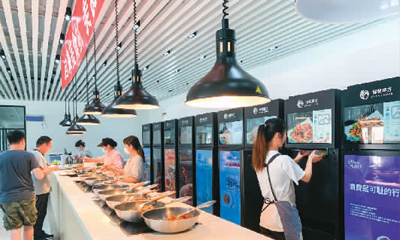Smart robotic chefs improve cooking efficiency, guarantee food safety

Employees at a smart restaurant in east China’s Qingdao put ingredients into robotic machines for cooking into a final dish. (People's Daily Overseas Edition/Zhao Shuyan)
At a restaurant in the eastern Chinese city of Qingdao where meals are cooked by robotic chefs, customers can watch the process of food being cooked in a futuristic kitchen while feeling safe and assured about the food that they eat.
It takes an average robot less than 10 minutes to cook up a dish, with the ingredients and seasonings prepared in advance by restaurant staff members. The colors and flavors of the dishes are almost the same as those cooked by human cooks.
The robotic kitchen, in an attempt by the restaurant to innovate its business with a long-term vision of freeing people from the task of cooking, marks a further step taken by the catering industry towards becoming more industrialized, intelligent, and automated.
Ge Wu, general manager of the Qingdao-based kitchen robot company, said such kitchens are more effective in reducing the waste of raw materials. Statistics indicated that about 30 percent of vegetables are wasted during the logistics process and another 20 percent are wasted during the cooking process. To improve this situation, the vegetables ordered by a smart restaurant will first be transported to a factory to be pre-washed and in this way will arrive at the restaurant ready for cooking. Throughout this whole process, there will be minimal waste in raw materials generated. Furthermore, since leftover vegetables from the restaurants will be turned into animal feedstuff, the restaurant can eliminate the pressures associated with the disposal of its kitchen waste.
According to Li Quanhong, a professor of food sciences and nutrition engineering with China Agricultural University, smart restaurants are reshaping the catering industrial chain as they require a less intensive use of human cooks and focus more on other links in the supply chain, such as the production and manufacturing of raw materials.
Driven by such a change, the involvement of characteristic and standard planting bases in supplying raw materials to automated restaurants has become crucial in promoting the integrated development of the first, secondary and tertiary industries.
Smart restaurants reflect the fact that catering companies nowadays are paying more attention to the safety and freshness of food, as well as creating a safe and comfortable dining environment for their consumers, especially against the backdrop of the COVID-19 pandemic when self-served and smart restaurants emerged as useful initiatives to avoid cross-infection, while satisfying people’s needs for safe, healthy, and nutritious food, according to Jiang Junxian, head of the China Cuisine Association.
Photos
 Dance show saluting traditional culture of the Song Dynasty makes its debut
Dance show saluting traditional culture of the Song Dynasty makes its debut Village in SW China’s Yunnan embraces prosperity through agricultural tourism
Village in SW China’s Yunnan embraces prosperity through agricultural tourism Eighth birthday for pair of giant pandas celebrated in Haikou, Hainan province
Eighth birthday for pair of giant pandas celebrated in Haikou, Hainan province Olympic gold medalists portrayed in Shanxi artist’s polymer clay sculptures
Olympic gold medalists portrayed in Shanxi artist’s polymer clay sculptures
Related Stories
- China's first building assembling robot rolls off production line
- China’s robotics industry sees rapid development
- Smart restaurants make dining more interesting, safer
- Young scientist defies tough natural conditions, devotes himself to robotics research
- China's industrial robot production surges in October
- Alibaba deploys autonomous logistics robots for ‘Double 11’ package delivery
Copyright © 2021 People's Daily Online. All Rights Reserved.






